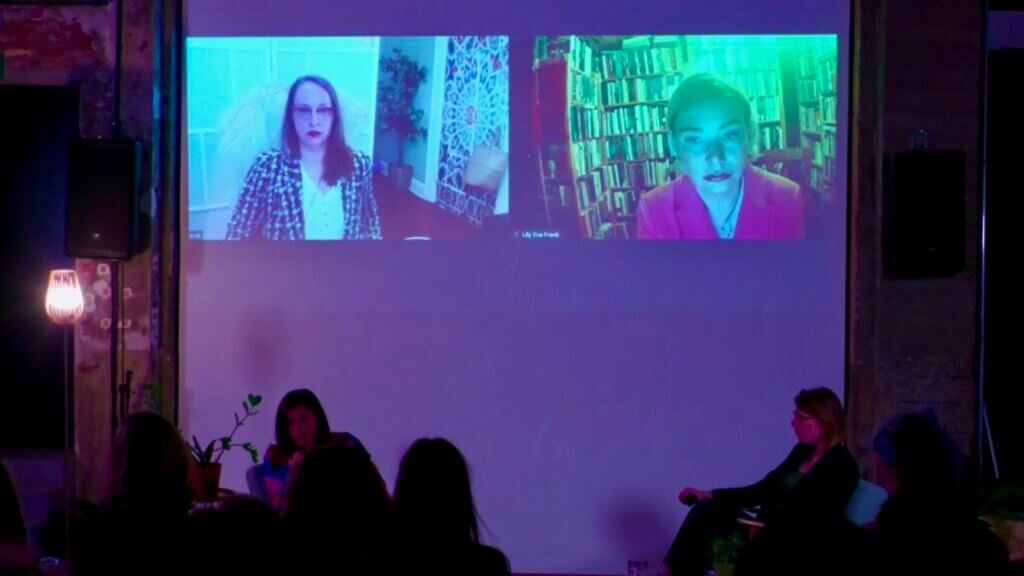V-fest Debuts First English-Language SexTech Panel
- April 23, 2024
- Posted by: Jenna Owsianik
- Category: Media

The SexTech News blog is supported by its readers and may include affiliate links. Learn more.
It was a treat for me to participate virtually at Belgium’s V-fest sexuality festival last March in its first English-language SexTech panel.
V-fest is an annual event held by the secular humanist community hub Huis van de Mens, which translates from Dutch to “House of Humans.”
Fellow speakers Chloé De Bie, a clinical sexologist and relationship therapist, and Dr. Lily Frank, an Assistant Professor of Philosophy and Ethics at Eindhoven University of Technology, joined me for the SexTech Talk.
Journalist Deborah Seymus hosted the SexTech panel, asking questions on a range of topics related to sexual technologies including sex robots, ethics and consent, accessibility, and femtech.
The full SexTech Talk is available as a podcast episode on Spotify. If you’d like the “crib notes” version, I’ll share some highlights below.
The SexTech panel scoop at V-fest

To kick off the questions, Seymus asked me what is sex tech, and I explained the origins of the term and its ties to femtech. As per usual, I deferred to the word’s creator, Cindy Gallop of MakeLoveNotPorn, when providing a definition:
“Sextech is technology, and technology-driven ventures, designed to enhance, innovate and disrupt in every area of human sexuality and human sexual experience.”
I added that while the term itself is relatively new, sexual and related technologies have been around for a very long time.
Sex robots
As the world is fascinated by the concept of sex robots, Chloé De Bie gave insights on whether it’s possible to rape a robot. In short, she said no—not at this time at least:
“We never know what the future will hold and how we will see those entities because technology is evolving so fast. I can see a future, but it’s far away, where maybe we need to think about what is a sex robot?”
“If we start to acknowledge it as an entity yet, then it becomes a whole other story.”
Augmented reality and a ’90s heartthrob
Although there’s often handwringing in the press over the potential risks of sex robots and virtual reality, Lily Frank raised concerns about augmented reality.

Of course, there’s tremendous possibility for how it may enhance human sexuality and fulfill long-held fantasies. For example, Frank gave the winning quote of the evening, which was met with giggles from the crowd:
“It’s very possible we will have technologies where we can see someone different from our own partner when we’re having sex with them. Maybe I get to see 1998 Leonardo DiCaprio instead of my husband, or whoever your flavour is.”
On the flip side, Frank added that indulging in augmented reality to transform how your partner appears during sex could create barriers:
“We are then going deeper inside ourselves and inside a fantasy world rather than using the moment of intimacy we have to actually connect. That’s my concern, greater than the potential of falling in love with a robot over an actual partner.”
Femtech
The conversation circled back to femtech a few times, and I spoke about what femtech is and how these startups face funding challenges.
Femtech refers to technologies designed for the health and wellness of the female body. They cover many needs such as those for sexual health, mental well-being, pregnancy, menstruation, and menopause.
Sextech startups in general often struggle to gain investors due to the stigma and shame around sex. Many venture capitalist (VC )firms outright refuse to fund them under so-called vice clauses.
Yet femtech encounters additional hurdles, largely due to cultural legacies of devaluing female sexuality and health. As a result, there’s less buying power among consumers due to both a lack of education and taboo.
It’s a vicious cycle.
Femtech startups face a high mortality rate. Without significant success stories or substantial returns from femtech companies going public, investors are hesitant to fund them.
Since there are also very few female investors—only 6% of VC investors in the United States are women—arguably fewer VCs are able to spot and willing to take a chance on this underserved category.
Want to hear more from the SexTech Talk? Listen to the V-fest sextech panel podcast episode on Spotify.
